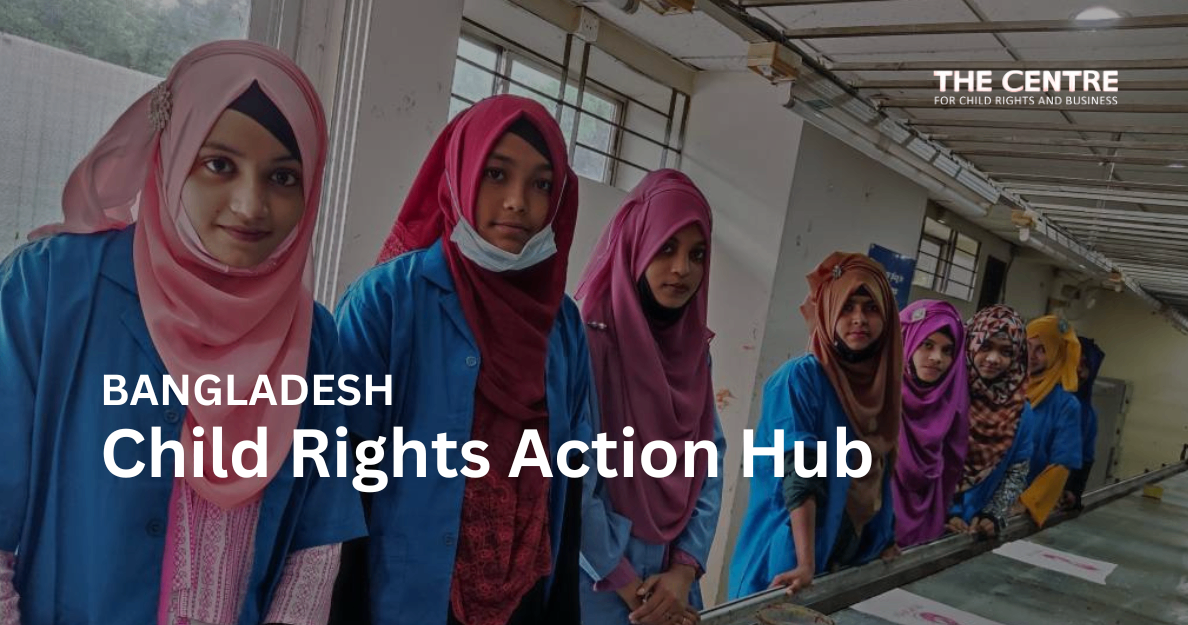
Child labour in the ready-made garment (RMG) supply chains remains a significant issue in Bangladesh, particularly at the sub-contractor and lower-tier level. Despite evolving human rights due diligence frameworks and regulations, the risk of child labour persists, and there is a call for faster progress.
Across Asia, the number of children in child labour is on the rise, reaching 62 million1. In Bangladesh, around 8.90% of children aged 5-17 years were working in 2022, up from 8.70% in 20132. Out of the country's 39.96 million children in this age group, approximately 3.5 million were found to be working, with more than one in five of them working in the industrial sector, such as the RMG industry3.

The Child Rights Action Hub
To address this issue, The Centre has launched the Child Rights Action Hub in Bangladesh, specifically for the RMG sector. The Action Hub aims to empower fashion brands and retailers to engage lower-tier suppliers in preventing and addressing child labour.
The Action Hub’s main goal is to prevent and remediate child labour in Bangladesh's RMG sector in the long term. It aims to achieve this by better understanding the socioeconomic and contextual risk factors, increasing visibility into the challenges, conditions and opportunities in lower tiers, collaborating with other stakeholders to tackle child labour risks at scale, and mitigating child labour risks in the supply chain.
How it Works
The Action Hub facilitates collaborative action, enabling brands to participate in joint activities to address child labour risks in their supply chain. Four different workstreams have been initiated, starting with research and mapping.
1. Research, Mapping and Networking
Data from three Tier-1 factories have already been collected to understand suppliers' selection process and map the supply chain down to their Tier-3 and Tier-4 suppliers. The next step is to conduct risk assessments to focus on these lower-tier suppliers and understand the context and needs of workers. The Hub also creates a strong network of stakeholders by establishing relationships with private entities, civil society organisations, and governmental bodies. This allows us to ensure that we leverage available resources for the prevention and remediation of child labour.
2. Training and Capacity Building to Lower Tiers
The second workstream is delivering training and capacity building to lower tiers, including a broad programme for lower-tier supplier tiers in Bangladesh. This programme will use the information gathered during the research phase. It will include training on child labour prevention, improvement of broader human rights due diligence (HRDD) standards at each factory, and training that addresses workers' challenges.
3. Child Labour Prevention and Remediation Training
Child labour is most prevalent in lower-tier factories that are often unregulated and opaque. To combat this issue, the third workstream focuses on child labour prevention and remediation training. It aims to equip these factories with the necessary resources to establish an effective child labour prevention and remediation programme. There are currently 84 active child labour cases under The Centre’s remediation programme in Bangladesh, and we are hoping that the Action Hub can expand its reach to support more children in lower tiers.
4. Youth Development
The last workstream aims to promote decent work for youth. Young workers are often being forced to work in subcontractors and the informal sector. This puts them at risk of abuse, child labour, forced labour, and trafficking. In Bangladesh, 29.8% of youth are outside education, employment, or training (NEET)4. The Action Hub helps factories create and support decent work for young workers. By enabling young workers to secure jobs in the formal sector and supporting their growth opportunities, they can avoid or transition out of hazardous positions in lower supply chain tiers and the informal sector.
This is an initial pilot phase for the activities in the workstream. Through its four workstreams, the Action Hub is taking a comprehensive approach to address the root causes of child labour, improve working conditions and tackle the challenges that workers face. The Action Hub will use this pilot to broaden the programme's reach further.
How to Get Involved
The Child Rights Action Hub works with existing systems that can be tapped into to provide best possible solutions for a child labour prevention and remediation programme such as government-run services, CSOs, among others. It is open to all interested brands, retailers and supply chain intermediaries.
To get involved, please reach out to us.
By supporting the Action Hub, you can help to create a safer and more responsible supply chain that prioritises the welfare of children, workers, and their families. Together, we can make a difference and ensure all children stay out of child labour and have access to education and decent work opportunities. Join us in promoting responsible sourcing in Bangladesh's RMG sector.
__________________________
1 2023 World Day Against Child Labour, United Nations
2 Bangladesh National Child Labour Survey 2022
3 Bangladesh National Child Labour Survey 2022
4 Bangladesh National Child Labour Survey 2022
By using this website, you agree to our use of cookies. We use cookies to provide you with a great experience and to help our website run effectively.